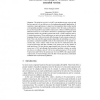Free Online Productivity Tools
i2Speak
i2Symbol
i2OCR
iTex2Img
iWeb2Print
iWeb2Shot
i2Type
iPdf2Split
iPdf2Merge
i2Bopomofo
i2Arabic
i2Style
i2Image
i2PDF
iLatex2Rtf
Sci2ools
140
click to vote
EUROPAR
2005
Springer
2005
Springer
Hierarchical Scheduling for Moldable Tasks
The model of moldable task (MT) was introduced some years ago and has been proved to be an efficient way for implementing parallel applications. It considers a target application at a larger level of granularity than in other models (corresponding typically to numerical routines) where the tasks can themselves be executed in parallel on any number of processors. Clusters of SMP (symmetric Multi-Processors) are a cost effective alternative to parallel supercomputers. Such hierarchical clusters are parallel systems made from m SMP composed each by k identical processors. These architectures are more and more popular, however designing efficient software that take full advantage of such systems remains difficult. This work describes approximation algorithms for scheduling a set of tree precedence constrained moldable tasks for the minimization of the parallel execution time, with a scheme which is first used for two multi-processors and several bi-processors and then extended to the g...
Related Content
| Added | 27 Jun 2010 |
| Updated | 27 Jun 2010 |
| Type | Conference |
| Year | 2005 |
| Where | EUROPAR |
| Authors | Pierre-François Dutot |
Comments (0)

